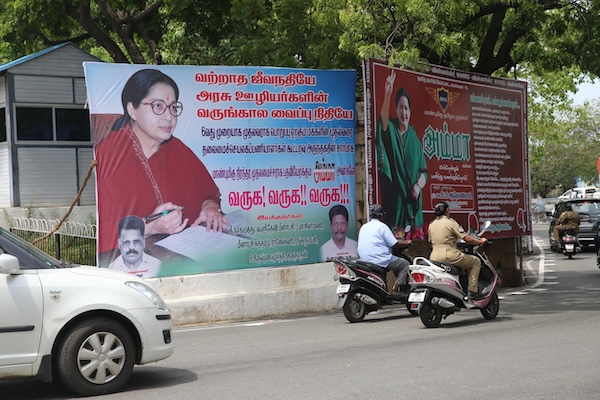.png)

Dr. Srinath Sridharan is a Corporate Advisor & Independent Director on Corporate Boards. He is the author of ‘Family and Dhanda’.
October 7, 2025 at 9:09 AM IST
In a country where capitalism was born out of permission rather than freedom, the State has never been far from the boardroom. India’s private sector, even three decades after liberalisation, still lives within the long shadow of government. That relationship - equal parts protection, partnership, and paternalism - has once again come to the surface as reports emerge of senior cabinet ministers preparing to meet the leadership of the Tata Group to take stock of internal turbulence within Tata Trusts, the controlling shareholder of Tata Sons.
The government is said to be concerned that the divisions among trustees could begin to affect the functioning of Tata Sons, the holding company of the $180-billion conglomerate whose reach spans from salt to semiconductors. For New Delhi, a crisis in one of India’s oldest and most respected industrial houses is a matter of systemic stability, national image, and market confidence. If the internal strife of Tata Trusts - about director appointments, information sharing, and governance oversight - spills into the operations of Tata Sons, the tremors could easily ripple across sectors and spook investors.
In a market where a handful of conglomerates dominate everything from infrastructure and finance to technology and daily consumption, the government’s worry is not misplaced. These entities are systemic anchors whose tremors can ripple across employment, credit markets, and even public sentiment. The concern is amplified in the case of the Tata Group, which only a few years ago went through a prolonged governance tiff at the very top of its boardroom, leaving reputational bruises that took years to heal.
A renewed perception of instability within such an institution risks unsettling not just investors but ordinary citizens whose pensions, savings, and aspirations are tied to these corporate behemoths. For a government managing both economic and emotional confidence in a billion-strong democracy, the instinct to monitor and steady such giants is not interference, but rather an act of political and macro economic self-preservation.
There is also a regulatory undertone to the moment. The group faces a looming question around Tata Sons’ mandatory public listing, triggered by its classification as an upper-layer NBFC by the Reserve Bank of India in 2022. While Tata Sons has sought to deregister itself from that classification, the RBI’s position remains uncertain.
There is also a subtler dimension that deserves reflection — the moral complexity of philanthro-capitalism itself. The Tata Trusts, as majority shareholders of Tata Sons, embody a rare structure where charitable purpose and commercial power are fused. That duality, once celebrated as India’s ethical model of enterprise, now exposes a governance grey zone. Trusts that exist to serve the public good also wield disproportionate influence over private capital. When internal frictions emerge within such entities, they carry not just business implications but reputational and moral consequences for the entire framework of philanthropic ownership in India. The government’s anxiety, therefore, may not be limited to market stability; it could stem from the fear that if even the country’s most respected charitable trusts are seen as divided or opaque, it could shake faith in the broader ecosystem of trusts, endowments and foundations that now steward enormous wealth under the banner of public interest.
Yet, beneath the veneer of prudence lies a deeper dilemma. Every time the State steps into corporate territory beyond its formal regulatory role, it tests the thin line between reassurance and interference. India’s corporate governance architecture, built on the premise of shareholder rights, board independence, and transparent resolution mechanisms depends on one principle above all: that the rule of law, not the discretion of the powerful, governs business affairs. The government, in trying to be the stabiliser, may inadvertently become the stakeholder.
India’s business ecosystem has long relied on the moral authority of the State to contain what market mechanisms could not. We have seen this in many a large business family disputes over the years. But the very familiarity of this pattern is the problem. Each time the government steps in to “steady” a private sector dispute, it reinforces the notion that corporate India cannot entirely govern itself — that it ultimately needs the State’s soft power to resolve its hardest conflicts.
This erodes both institutional accountability and market discipline. It signals to investors that corporate governance frameworks are not self-sufficient, and that boardroom outcomes can be influenced through political access. For a nation that has spent three decades trying to move from personality-driven capitalism to rule-driven capitalism, that perception is a harder mirror.
But before the State positions itself as moral custodian of corporate discipline, should it not look inward? How many of its own public sector undertakings meet the very governance standards it now seeks to expect standards about? How many public sector banks have fully functional boards, with independent directors in place and audit and risk committees that meet even the minimum frequency mandated by regulation? How many PSUs release timely disclosures, transparent remuneration data, or board evaluations as required under law? Can a government that routinely extends the tenures of executives through opaque processes, or fills crucial board positions months late, credibly claim to defend governance in the private sector? If the State itself struggles to ensure accountability in enterprises it wholly owns, what moral authority does it have to mediate between shareholders of companies it does not? Shouldn’t reform begin at home—where inefficiency, political patronage, and absence of professional autonomy still corrode value far more than any family dispute in India Inc?
The Tata episode is especially emblematic because the group has always represented the moral centre of Indian capitalism. It shows that even the most ethical and institutionally conscious groups are not immune to internal contestation, and that the temptation for government to “help” remains strong. Yet it is precisely in such complex situations that the strength of institutional governance should be tested, not substituted.
For the government, the risk lies not in the act of engagement but in the precedent it sets. Once the State is seen as an arbiter in the affairs of one major group, others may seek similar attention in their moments of crisis. The language of “national interest” becomes elastic, stretched to justify political mediation in corporate life. Over time, this can blur the predictability that global investors crave. They may begin to see India’s economic environment not as an open market but as a managed ecosystem where access matters as much as merit.
Yet, one must also acknowledge the political and psychological realities of the Indian market. The public still expects the government to act as guardian in times of uncertainty. Silence is often interpreted as indifference. When a crisis brews in a corporate house that commands public trust and symbolic weight, even a neutral government feels compelled to “be seen” as engaged. The optics of reassurance, in such times, become a political necessity. The task, therefore, is not to eliminate intervention entirely, but to ensure that it is institutional, transparent, and time-bound—anchored in process, not personality.
The long-term goal for India must be to evolve from government-led capitalism to governance-led capitalism. This means strengthening mechanisms that allow disputes to be resolved within the corporate framework - independent boards, empowered minority shareholders, strong trust deeds, and regulatory oversight that acts without fear or favour. The government’s ultimate duty is not to take sides within boardrooms but to ensure that the laws of governance are robust enough to prevent any need for its involvement.
The real test of the government’s economic stewardship is not how swiftly it can intervene, but how confidently it can step back. In doing so, it would affirm that India’s corporations are not wards of the State but engines of enterprise guided by law, not by liaison. The State’s power is best exercised not through presence in the boardroom, but through the credibility of the institutions that govern it, and the regulations that govern such a corporate behaviour. This is where lies the true mark of a mature economy — one where governance, not government, becomes the final word in the boardroom.




